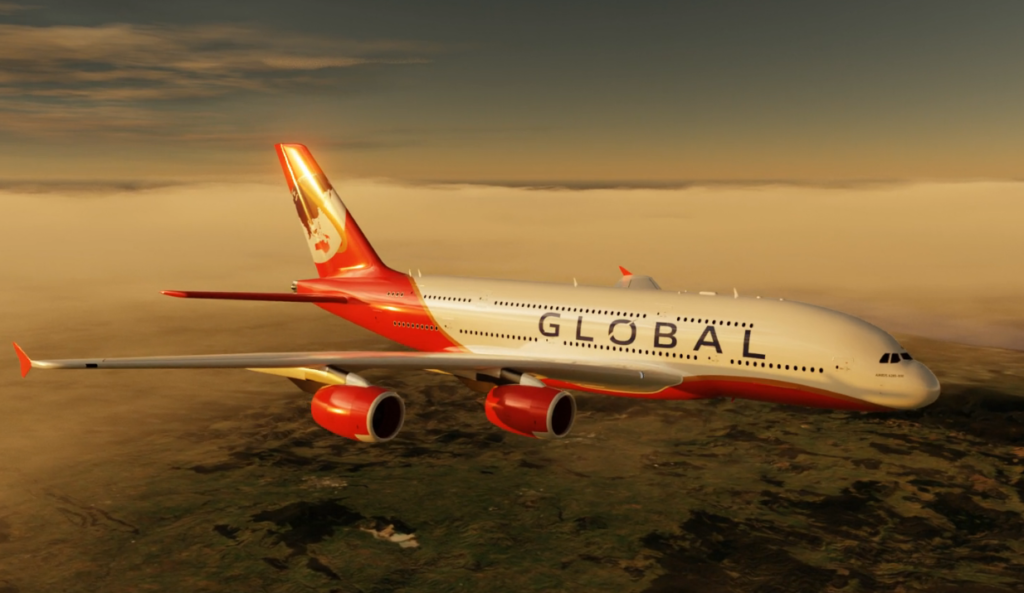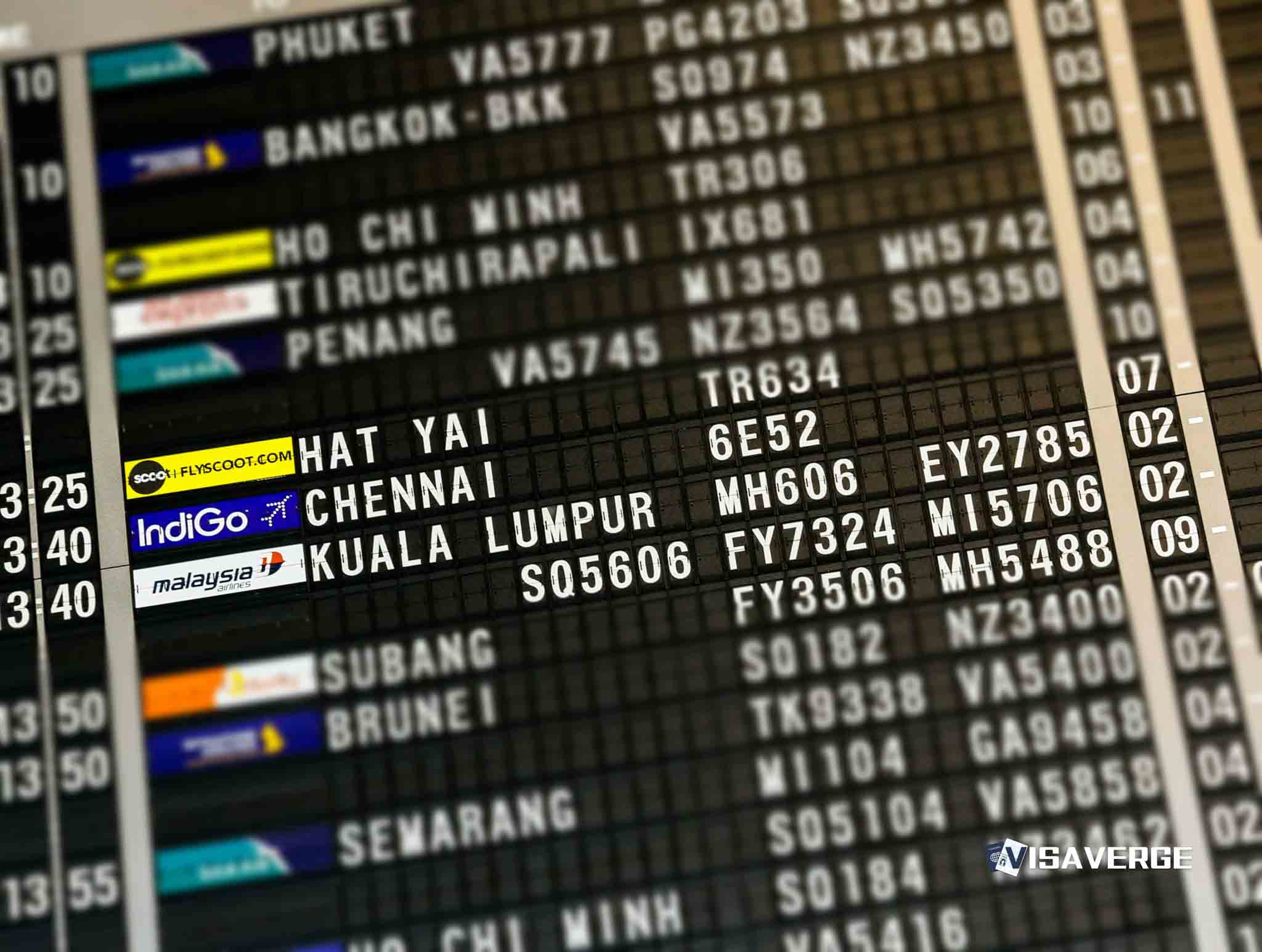Key Takeaways
• Global Airlines launched Airbus A380 flights Manchester-New York starting May 21, 2025, using a refurbished aircraft.
• Flights operate under wet-lease with Hi Fly; only four charter flights booked via Travelopedia in May.
• Initial low passenger numbers and regulatory hurdles challenge profitability and future regular service expansion.
Global Airlines made headlines this month with the launch of its Airbus A380 service between Manchester and New York, a bold move in the busy transatlantic travel market. On May 25, 2025, the airline’s return flight from New York JFK to Manchester marked a key moment for the startup, which aims to bring back the “Golden Age of Travel” with its unique approach. But behind the excitement, passengers and industry experts are watching closely to see if this ambitious project can overcome the many challenges facing new airlines—especially those operating the world’s largest passenger jet.
Global Airlines’ Manchester-New York A380 Launch: What Happened and Why It Matters

Who: Global Airlines, a new airline founded by British entrepreneur James Asquith
What: Launch of Airbus A380 service between Manchester and New York JFK
When: First Manchester-New York flight departed May 21, 2025; return flight scheduled for May 25, 2025
Where: Manchester International Airport (UK) to John F. Kennedy International Airport (United States 🇺🇸)
Why: To enter the competitive UK-US market and revive luxury air travel
How: Using a single, refurbished Airbus A380, operated through a wet-lease with Hi Fly
This launch is significant because it marks the first time in years that a new airline has tried to break into the transatlantic market with an Airbus A380. The A380 is the largest passenger plane in the world, known for its double-decker design and ability to carry over 500 people. Global Airlines’ decision to use this aircraft for the Manchester-New York route is both bold and risky, especially as established airlines are already struggling with lower demand for US flights.
The Aircraft: A Second Life for the Airbus A380
The plane at the center of this story is a 12-year-old Airbus A380, registration 9H-GLOBL. Before joining Global Airlines, it flew for China Southern Airlines and then sat unused in California’s Mojave aircraft boneyard. The airline spent millions to refurbish the aircraft, giving it a fresh look and new features for passengers.
Key details about the aircraft:
– Three cabin classes:
– 8 First Class seats
– 70 Business Class seats
– 428 Economy Class seats (called “Global Traveller”)
– Economy on both decks: 76 of the economy seats are on the upper deck, a rare feature for most airlines
– Modern amenities: Overhauled cabins, new catering, and special amenity kits for all passengers
However, Global Airlines does not operate the plane directly. Instead, it uses a wet-lease agreement with Hi Fly, a Portuguese company that provides the aircraft, crew, maintenance, and insurance. The plane is officially registered under Hi Fly’s Maltese subsidiary, which holds the necessary air operator’s certificate (AOC). This arrangement allows Global Airlines to fly without having its own AOC, but it also means the airline has less control over some aspects of the operation.
The Passenger Experience: Hype, Hiccups, and High Hopes
For many travelers, the idea of flying on an Airbus A380 between Manchester and New York is exciting. The A380 is famous for its quiet ride, spacious cabins, and smooth takeoff and landing. Global Airlines has tried to build on this by promising a return to luxury and comfort, with special touches like:
- Limited edition amenity kits for all passengers
- New catering menu designed to improve in-flight meals
- Chauffeur service to the airport for First and Business Class passengers (provided by Blacklane, with certain conditions)
Despite these efforts, the first flights have not been without problems. Reports from the inaugural Glasgow-New York service (the airline’s first commercial flight, launched May 15, 2025) suggest that only 95 to 170 passengers were on board—about a third of the plane’s total capacity. This low number raises questions about whether the airline can fill such a large aircraft on a regular basis.
Ticket prices have also changed quickly. At first, economy fares were set at £780 (about $1,000) for a return ticket, but these were soon discounted to £380 to attract more passengers. Business Class return tickets cost £1,999 ($2,660), and First Class return tickets are £2,999 ($3,990). These prices are competitive, especially for the premium cabins, but it’s not clear if they are enough to cover the high costs of running an A380.
Company Background: The Vision Behind Global Airlines
James Asquith, the founder of Global Airlines, is no stranger to travel. At 36, he already runs Holiday Swap, an online platform for travelers. His goal with Global Airlines is to bring back the glamour and comfort of flying that many people feel has been lost. He has spoken openly about the problems with modern air travel, such as long security lines, poor service, and bad food, promising that his airline will offer “the best experience in the sky.”
Asquith’s vision includes more social spaces on future aircraft, such as bars and lounges where passengers can relax and meet each other. However, he admits that getting approval for these features from aviation authorities will take “many years.” For now, the focus is on delivering a better experience within the current rules.
How the Flights Are Operated: Wet-Lease and Charter Arrangements
One of the most important details about Global Airlines’ Manchester-New York service is that it is not a regular, scheduled flight. Instead, the airline is operating just four charter flights in May 2025, which can be booked through a travel agent called Travelopedia under the GA.FLIGHTS brand.
Key points about the operation:
– No own AOC: Global Airlines does not yet have its own air operator’s certificate, which is required to run regular flights
– No regular permits or slots: The airline does not have the necessary permissions or airport slots for ongoing service to the United States 🇺🇸
– Flights bookable only through Travelopedia: Passengers must use the GA.FLIGHTS website, powered by Travelopedia, to buy tickets
This setup allows Global Airlines to test the market and build experience before applying for its own AOC and expanding to regular service. However, it also means the airline is limited in what it can offer and must rely on partners for many aspects of the operation.
Challenges Facing Global Airlines: Can the A380 Succeed on Manchester-New York?
While the launch of the Manchester-New York Airbus A380 service has generated excitement, Global Airlines faces several big challenges:
1. Limited Operations
With only four charter flights planned and no regular schedule, the airline’s presence in the market is very small. This makes it hard to build a loyal customer base or attract frequent flyers who need flexibility.
2. Regulatory Hurdles
Without its own AOC or the right permits, Global Airlines cannot operate regular flights to the United States 🇺🇸. Getting these approvals can take months or even years, and there is no guarantee of success.
3. Market Competition
The transatlantic market is one of the most competitive in the world. Established airlines like British Airways, Virgin Atlantic, and American Airlines already offer multiple daily flights between the UK and United States 🇺🇸. These airlines have strong loyalty programs, business partnerships, and years of experience. In addition, British Airways has reported weaker demand for US holiday flights, which could make it even harder for a new airline to succeed.
4. Load Factor Concerns
The low number of passengers on the first flights is a warning sign. The Airbus A380 is expensive to operate, and airlines need to fill most of the seats to make money. If Global Airlines cannot attract enough passengers, it may have to lower prices further or cut back on service.
5. Financial Sustainability
Running an A380 is costly. Fuel, maintenance, airport fees, and crew costs are all higher than for smaller planes. Unless the airline can keep the planes full and charge enough for tickets, it may struggle to stay in business.
The Bigger Picture: What Does This Mean for Passengers and the Industry?
For travelers, the arrival of Global Airlines and its Manchester-New York A380 service offers more choice and the chance to experience a different style of flying. The airline’s focus on comfort, service, and special amenities could push other airlines to improve their own offerings.
However, there are risks for passengers as well. Because the airline is new and only running a few flights, there is less certainty about schedules, customer support, and what happens if something goes wrong. Travelers should be aware of these factors when booking.
For the industry, Global Airlines’ launch is a test of whether there is still a place for the A380 on transatlantic routes. Many airlines have retired their A380s or use them only on the busiest routes, as smaller, more efficient planes have become popular. If Global Airlines can make the A380 work between Manchester and New York, it could inspire others to try similar services.
What’s Next for Global Airlines?
The next few months will be critical for Global Airlines. If the initial charter flights go well, the airline may be able to apply for its own AOC and start regular service. This would allow it to expand to other routes and offer more flights.
However, if demand remains low or the airline cannot get the necessary permits, it may have to change its plans. Some experts suggest that Global Airlines could look at other routes where there is less competition or more demand for large aircraft.
According to analysis by VisaVerge.com, the airline’s ability to adapt and find the right market will be key to its survival. The company’s leadership, experience with travel technology, and willingness to try new ideas could help it overcome the challenges ahead.
Practical Guidance for Interested Passengers
If you are thinking about booking a flight with Global Airlines on the Manchester-New York route, here are some tips:
- Check the booking site: All tickets are sold through the GA.FLIGHTS website, powered by Travelopedia. Make sure you understand the terms and conditions before buying.
- Be flexible: With only a few flights scheduled, there may be changes or cancellations. Have a backup plan in case your flight is affected.
- Watch for updates: The airline may add more flights or change its schedule as it works to get its own AOC and expand service.
- Compare prices: While Global Airlines offers competitive fares, check other airlines to make sure you are getting the best deal for your needs.
- Know your rights: If you are flying between the United Kingdom and United States 🇺🇸, you are protected by certain passenger rights. For more information, visit the U.S. Department of Transportation’s Aviation Consumer Protection page.
Final Thoughts: A Bold Bet on the Future of Air Travel
Global Airlines’ launch of the Manchester-New York Airbus A380 service is a bold move that has captured the attention of travelers and industry experts alike. The airline’s focus on comfort, service, and the romance of flying is a welcome change for many passengers who feel that air travel has become too basic.
However, the road ahead is full of challenges. From filling the massive A380 to getting the right permits and competing with established airlines, Global Airlines will need to be flexible, creative, and persistent to succeed.
For now, the airline’s Manchester-New York route offers a glimpse of what air travel could be if airlines put passengers first. Whether this vision can survive in the tough world of transatlantic flights remains to be seen, but for those lucky enough to be on board, it promises to be a memorable journey.
As the story of Global Airlines unfolds, travelers, industry insiders, and competitors will be watching closely. The next steps—securing an AOC, expanding routes, and building a loyal customer base—will determine whether this ambitious airline can truly bring back the “Golden Age of Travel” on the Manchester-New York route and beyond.
Learn Today
Airbus A380 → The world’s largest double-deck passenger airplane, seating over 500 travelers in multiple classes.
Wet-lease → An agreement where one airline provides aircraft, crew, maintenance, and insurance to another airline.
Air Operator’s Certificate (AOC) → A regulatory approval allowing an airline to conduct commercial air transport operations.
Charter Flights → Non-scheduled flights arranged for specific trips, not operating on regular timetables or slots.
Load Factor → Percentage of seats filled on a flight, critical for airline profitability on large aircraft.
This Article in a Nutshell
Global Airlines’ A380 debut on the Manchester-New York route revives luxury travel dreams amid fierce competition. Using a wet-leased refurbished A380, the startup tests market demand through limited charter flights with competitive fares and premium service. Success depends on overcoming regulatory and financial challenges in this transatlantic venture.
— By VisaVerge.com








